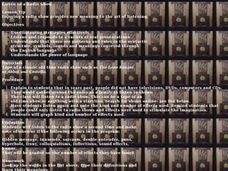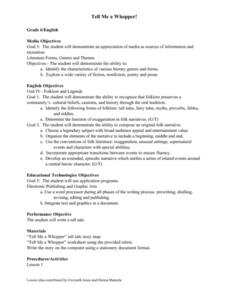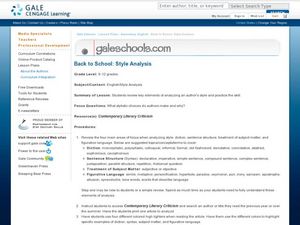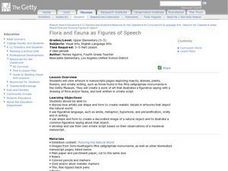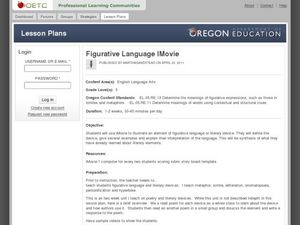Curated OER
Listen to a Radio Show
Students practice the art of listening. In this listening skills lesson, students listen to an old-time radio show and identify hidden messages, innuendo, sarcasm, double entendres, puns, hyperbole, irony, colloquialisms, inflections,...
Smarter Balanced
Effects of Water
To prepare for a performance task assessment, class members review the stages of the water cycle and then individuals assume the roles of drops of water for a Reader's Theater exercise. The script, a graphic depicting the water cycle,...
Reed Novel Studies
Fourth Grade Rats: Novel Study
Things sure change in year's time. Suds, from Fourth Grade Rats, went from a third grade angel to a fourth grade rat! Although he is not necessarily happy with his new self, he worries he will lose his popularity. Learners complete...
Reed Novel Studies
Scat: Novel Study
If the most terrifying teacher in the school was lost, would you try to find her? Well, when the toughest teacher in the school is lost on a field trip, Nick and Marta, characters in Scat, decide to go looking for her. Readers discover...
Shakespeare Globe Trust
Much Ado About Nothing
Love, deception, witty bante—that's much ado about a lot! As learners navigate the resource, they view an interactive character map and read character biographies from Shakespeare's Much Ado About Nothing. Pupils also listen to...
Curated OER
So/Such
In this grammar worksheet, students use the words "so" or "such" to write an exaggeration based on the statement that is on the page. They write 6 exaggeration sentences.
Curated OER
So/Such Vocabulary Skills
In this vocabulary skills worksheet, students write their own sentences that show exaggeration using the 7 sets of ideas provided.
Curated OER
Tell Me a Whopper!
Sixth graders investigate tall tales as a literary genre. They listen to a number of tall tales to discover how exaggeration is used as a story element. They write and publish a tall tale using word processing software. They illustrate...
New Vista Middle School
Hyperboles
Turn hyper bowls into hyperboles that will take away the breath of your principal and learners with the knowledge available in this presentation. The PowerPoint provides very clear and accurate information that breaks down how hyperboles...
Curated OER
Tell a Ton of Tall Tales
Elementary schoolers read many tall tales. They create their own tall tale about a specific event of their choosing. They must act the part of the author. This well-designed lesson takes three class sessions to complete, and is...
Curated OER
Back to School: Style Analysis
Jump back into expository writing and analysis at the start of a new school year! Start with a review of an authors' stylistic choices in diction, syntax, treatment of subject matter, and figurative language. Writers choose a text to...
Curated OER
Sadako and the Thousand Paper Cranes
Have your class explore the effects of war by reading Eleanor Coerr's story, "Sadako and the Thousand Paper Cranes." This is a story about a sixth grader who lives in Hiroshima when the atomic bomb is dropped. Learners answer questions,...
Curated OER
Political Cartoon Analysis Guide
Political cartoons are very clever, and often have deep meanings. This worksheet has learners consider a political cartoon. Next, they answer four questions regarding the cartoon. A very clever and effective teaching resource.
Curated OER
Reading the Play
Do figures of speech enhance a play or story? In small groups, learners locate and describe figures of speech they find while reading a reader's theater play. After making predictions, they describe how the figures of speech make the...
Curated OER
Fact or Opinion?
Challenge your class to determine between facts or opinions in the following PowerPoint. Each section contains an advertisement with stated facts and opinions. This is a great game for learners to play individually or with partners.
Curated OER
Elements of Poetry
Prepare your learners to identify figurative language in poetry. Tips for reading poetry and what to look for are listed on these slides. Rhetorical devices are defined and plenty of examples are given.
Curated OER
Use Digital Photos of Scary Things to Inspire Poetry Writing
There's nothing like a provocative image to inspire a creative writing session. In the language arts lesson presented here, middle schoolers bring in digital photos of scary objects, such as a big spider, or a hornet's nest. The pictures...
Curated OER
Poetic Elements
Poetry is all about sound and rhythm. The sound of the words, the rhythm of the lines, and the emotional atmosphere created by these elements and the literary devices poets use, compress whole stories into a few stanzas. The specialized...
Ohio Department of Education
A Glossary of Literary Terms
If you're tired of defining allusion, onomatopoeia, and satire for your language arts students, hand out a complete list of literary devices to keep the terms straight. Each term includes a definition that is easy to understand and...
Curated OER
Flora and Fauna as Figures of Speech
What a lovely way to incorporate artwork into your language arts lesson. View artwork in illustrated manuscript pages, depicting insects, animals, plants, flowers, and ornate writing in the Getty Museum. Practice using figurative...
Curated OER
The Final Word
Although this instructional activity is based on “Final Word,” Craig Wilson’s USA Today column, the strategies could be adapted to any local columnist. After reading three articles independently, groups share observations about content...
Curated OER
Men of Steel
Students explore early 20th century steel making. In this U.S. history steel making activity, students view and describe a postcard and a picture depicting exaggerated aspects of the steel industry. Students listen to a poem about Joe...
Georgia Department of Education
Exploring Poetry and Poets
Combine the study of poetry and non-fiction texts with this complete and ready-to-use six-week unit. After reading numerous poems from local writers and compiling a personal anthology, high schoolers find and read a memoir or biography...
Curated OER
Figurative Language iMovie
In order to understand figurative language, learners read 5 poems, each exemplifying a different literary device. They discuss and write responses to each poem. They then choose one literary device which they will use as the basis for a...


